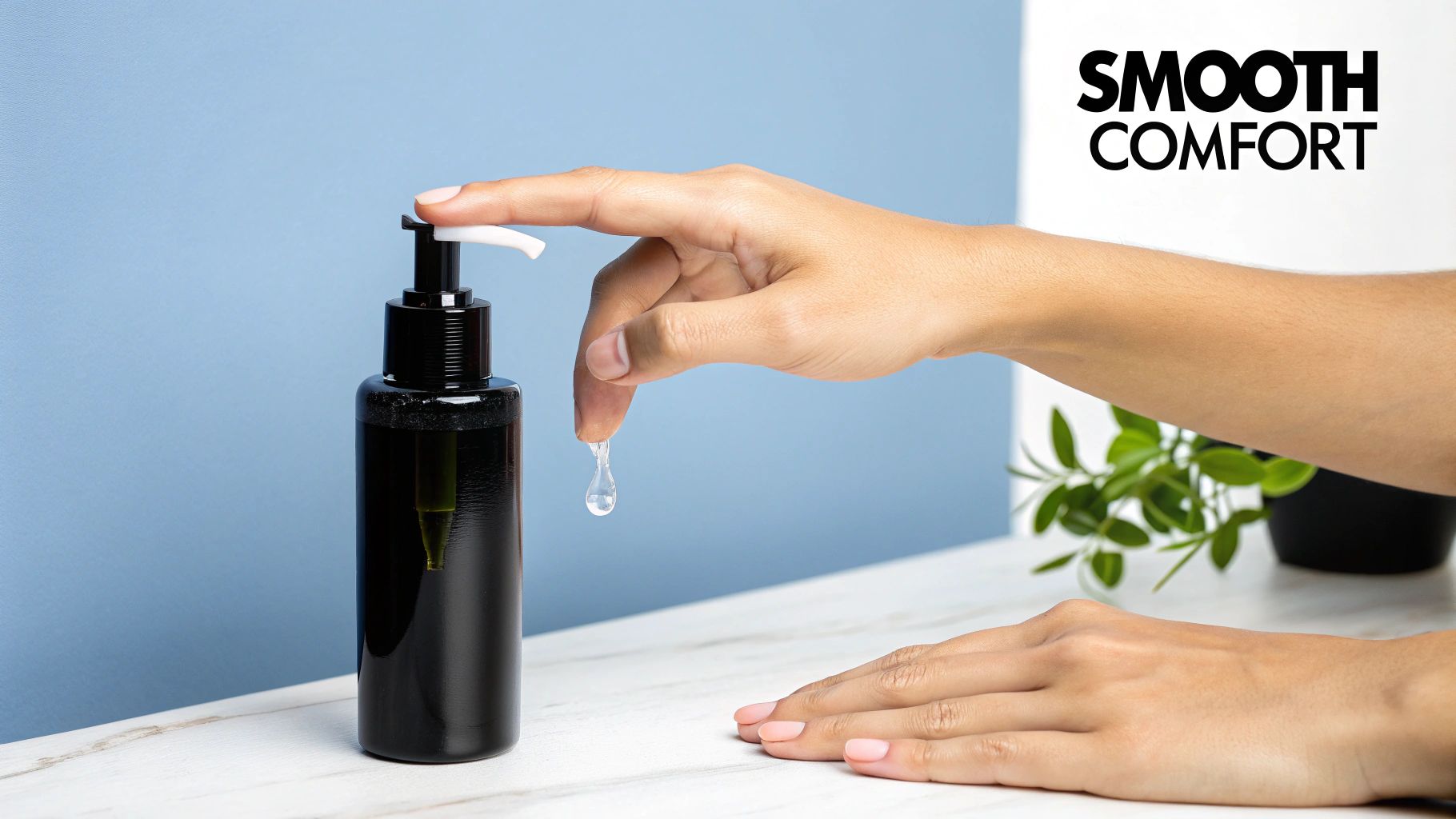Ready to Explore Intimacy?
Starting your sexual journey can feel exciting and maybe a little intimidating. This listicle offers essential sex tips for beginners to help you navigate intimacy with confidence. Learn how open communication, ample foreplay, and quality lubrication can enhance pleasure. We’ll cover safe sex practices, exploring your partner’s body, and managing expectations. These sex tips for beginners emphasize pleasure over performance and will help you build a foundation for a fulfilling and enjoyable sex life.
1. Open Communication and Consent
For beginners navigating the world of intimacy, open communication and consent aren’t just nice-to-haves—they’re absolute necessities. This foundational practice forms the bedrock of any healthy sexual relationship, ensuring both partners feel safe, respected, and comfortable expressing their needs and limits. It’s about creating a space where desires can be explored freely and enthusiastically, without pressure or assumptions. This open dialogue is crucial for building trust, deepening intimacy, and ultimately, experiencing more fulfilling sex. For men especially, understanding the nuances of communication and consent is vital for building stronger connections with their partners and ensuring everyone involved has a positive and enjoyable experience. This is why open communication and consent rightfully earns its place at the top of this list of sex tips for beginners.

Open communication and consent encompass both verbal and non-verbal cues. It’s about actively listening to your partner, paying attention to their body language, and checking in regularly. It also means being able to clearly express your own boundaries and understanding that consent can be withdrawn at any time, no questions asked. This ongoing exchange fosters a dynamic of mutual respect and allows both individuals to fully participate in shaping the intimate experience.
Successful implementation might look like a couple discussing their fantasies before engaging in sexual activity. They might use “I” statements like, “I’ve been curious about trying…” or “I really enjoy it when…” They also check in with each other during intimacy with questions like, “Does this feel good?” or “Is this too much?” This constant dialogue helps ensure both partners are on the same page and feel comfortable exploring new territories together. Another example might be a partner expressing a boundary by saying, “I’m not comfortable with that right now,” and the other partner respectfully acknowledging and accepting that boundary without question.
Here are some actionable tips for incorporating open communication and consent into your sex life:
- Start conversations outside the bedroom: Talking about sex in a relaxed, non-sexual setting can make it easier to broach potentially sensitive topics. Dinner dates, car rides, or even casual conversations on the couch can be great opportunities to initiate these discussions.
- Use “I” statements: Expressing your feelings and desires using “I” statements prevents blaming or accusing your partner. For example, instead of saying “You never initiate,” try “I would love it if you initiated sometimes.”
- Practice saying “yes,” “no,” and “maybe” clearly: Be assertive and direct about what you want and don’t want. It’s okay to be unsure, and saying “maybe” allows for further exploration and discussion.
- Check in regularly: During intimate moments, frequently ask questions like, “How does this feel?” or “Do you want to continue?” to ensure your partner is comfortable and enjoying the experience.
- Pay attention to non-verbal cues: Body language can speak volumes. Be mindful of your partner’s expressions and movements, and be willing to adjust your approach based on their non-verbal feedback.
While open communication might feel awkward initially, particularly for those new to these conversations, the benefits far outweigh the initial discomfort. It builds trust and intimacy between partners, reduces anxiety and performance pressure, and ultimately leads to safer and more enjoyable sexual experiences. By fostering open communication, you can discover mutual preferences and create a truly fulfilling and connected intimate life. It requires vulnerability and emotional maturity, and it might slow down some spontaneous moments initially, but the payoff is immense.
When and why should you use this approach? Always. Open communication and consent aren’t reserved for specific scenarios; they should be an integral part of every sexual encounter, from the first kiss to long-term relationships. It is the foundation for building trust, respect, and ensuring both partners feel safe and empowered. This is particularly crucial for men seeking to understand their woman’s body and desires better. By prioritizing communication, you can foster deeper intimacy and create a more fulfilling sexual connection.
Learn more about Open Communication and Consent This resource provides valuable communication exercises that can help you and your partner practice these skills and deepen your connection. Remember, open communication and consent are key ingredients for a satisfying and healthy sex life, especially for beginners. By embracing these practices, you are laying the groundwork for a more pleasurable and fulfilling journey of sexual exploration.
2. Take Time for Adequate Foreplay
One of the most crucial sex tips for beginners is understanding the importance of foreplay. For many, especially those new to sexual intimacy, jumping straight into intercourse can be a recipe for discomfort and dissatisfaction. Taking ample time for foreplay allows both partners to become physically and mentally aroused, creating a much more enjoyable and connected experience. Foreplay isn’t just a prelude to sex; it’s an integral part of the experience itself. It sets the stage for deeper intimacy, enhances pleasure, and ensures both partners feel comfortable and desired. By engaging in extended intimate touching, kissing, and other non-penetrative activities, you build anticipation and create a stronger emotional connection. This is vital for a fulfilling sexual experience for both individuals.

Foreplay involves a gradual building of sexual tension through various activities. Kissing, touching, and caressing are key components, allowing you to explore your partner’s body and discover what brings them pleasure. Focusing on erogenous zones throughout the body, not just the genitals, is a crucial aspect of effective foreplay. This exploration not only heightens physical arousal but also contributes to the mental and emotional preparation for intercourse. A fulfilling sex life often correlates with overall well-being, including energy levels. If you’re looking for ways to improve stamina and vitality, consider boosting your energy levels through natural methods. Shilajit For Men: Complete Guide To Natural Energy & Health from Oji Shilajit offers insightful information on this topic.
For men especially, understanding the significance of foreplay in a woman’s sexual response is crucial. Women generally take longer to become aroused than men, and adequate foreplay is essential for increasing natural lubrication and reducing potential discomfort during penetration. It’s about building anticipation and creating a shared experience of pleasure. For example, starting with gentle kisses and caresses, gradually moving to more intense touching, and incorporating oral stimulation can significantly enhance arousal for both partners. Paying attention to your partner’s responses – both verbal and non-verbal cues – is vital. Adjusting your approach based on their reactions ensures a mutually satisfying experience. Remember communication is key. Talk to your partner about what feels good and what doesn’t.
While the benefits of extended foreplay are numerous, it’s essential to acknowledge potential challenges. One common obstacle is the impatience to proceed quickly to intercourse. Resisting this urge and embracing the slow burn of foreplay can lead to a much more rewarding experience. Another challenge can be the pressure to “perform” during foreplay. Remember that foreplay is not about showcasing specific skills but rather about connecting with your partner and exploring pleasure together. It can be an end in itself, not just preparation for intercourse. Learn more about Take Time for Adequate Foreplay for more specific techniques and suggestions.
Here are a few actionable tips for incorporating effective foreplay into your sexual experiences:
- Dedicate Time: Spend at least 15-20 minutes on foreplay activities. This allows ample time for both partners to become fully aroused.
- Explore the Body: Don’t just focus on the genitals. Explore your partner’s entire body with your hands, lips, and other senses. Pay attention to their reactions and discover what they enjoy.
- Communicate: Talk to your partner about what feels good. Open communication enhances intimacy and ensures a more satisfying experience for both of you.
- Be Present: Focus on the sensations and the connection you’re building with your partner. Don’t rush the process, and enjoy the journey.
- Variety is Key: Experiment with different types of touch, kissing, and other non-penetrative activities to discover what works best for both of you.
By prioritizing foreplay, you’re not just setting the stage for satisfying sex; you’re also deepening your emotional connection with your partner and creating a more fulfilling and intimate experience overall. This makes taking time for adequate foreplay a crucial sex tip for beginners and experienced couples alike.
3. Use Quality Lubrication
One of the most overlooked yet crucial sex tips for beginners is using quality lubrication. Many new to intimate experiences assume natural lubrication will be sufficient, but this isn’t always the case. Incorporating personal lubricants can significantly enhance comfort, reduce friction, and elevate the experience for both partners, leading to more satisfying and pleasurable intimacy. Using lube isn’t something to be embarrassed about; it’s a tool that can help create a smoother, more enjoyable experience for everyone involved. It’s a simple addition that can make a world of difference, especially when navigating the nuances of sex for the first time.

Lubrication works by creating a slippery barrier between skin surfaces, minimizing friction during intercourse or other intimate activities. This reduced friction can prevent discomfort, chafing, and even minor tears in delicate tissues, particularly in the vaginal area. Beyond the physical benefits, lube can also enhance pleasure by providing a more sensual and smooth sensation. For men, it can increase sensitivity and reduce the risk of irritation during intercourse. For women, it can help alleviate dryness and make penetration more comfortable, ultimately increasing pleasure. This shared comfort and enhanced sensation translate to a more connected and enjoyable experience for both partners.
Understanding the different types of lube is key to successful implementation. The most common types are water-based, silicone-based, and oil-based. Water-based lubricants are the most versatile and compatible with most condoms, making them a safe and convenient choice for beginners. Silicone-based lubricants offer longer-lasting lubrication and are ideal for extended intimate sessions or activities involving water. However, they are not compatible with silicone sex toys. Oil-based lubricants can provide a rich and slippery feel, but they are not compatible with latex condoms as the oil can degrade the latex, increasing the risk of breakage. Within these categories, you’ll also find variations in viscosity (thickness) and added features like warming or cooling sensations.
Here are some examples of how using lubrication can improve the experience:
-
Increased Comfort During Penetration: A woman might not be producing enough natural lubrication due to factors like stress or hormonal changes. Using a water-based lubricant can ease penetration, making it more comfortable and enjoyable for both partners.
-
Enhanced Oral Sex: Lubricant can enhance oral sex by providing a more slippery and pleasurable sensation for both the giver and receiver. A flavored lubricant specifically designed for oral sex can add another dimension to the experience.
-
Exploring Anal Sex: The anal canal doesn’t self-lubricate, so using plenty of silicone-based lubricant is essential for comfortable and safe anal sex. This reduces friction and significantly minimizes the risk of discomfort or injury.
When exploring lubrication as a beginner, follow these actionable tips:
-
Start with Water-Based: Begin with a water-based lubricant as it’s the most versatile and compatible with most condoms and sex toys.
-
Patch Test: Before using any new lubricant, test a small amount on a less sensitive area of skin (like your forearm) to check for any allergic reactions.
-
Apply Generously: Don’t be shy with the lube! Apply a generous amount to both yourself and your partner as needed.
-
Reapply as Needed: Lubricant can dry up over time, so reapply as needed throughout your intimate activities.
-
Keep it Handy: Keep your lubricant within easy reach during intimate moments to avoid interrupting the flow.
-
Communicate: Talk to your partner about their preferences and comfort levels with different types of lubricants.
While the pros of using quality lubrication significantly outweigh the cons, it’s important to be aware of potential drawbacks: Some individuals may experience allergic reactions to certain ingredients, so always test a small area first. Oil-based lubricants should never be used with latex condoms. Some people may find the sensation of lube messy or unnatural. However, with careful selection and proper usage, these drawbacks can be easily minimized.
Using quality lubrication deserves its place on this list of sex tips for beginners because it addresses a fundamental aspect of comfortable and enjoyable sex: reducing friction and enhancing pleasure. It empowers individuals to take control of their sexual health and experience, leading to greater intimacy and satisfaction for both partners.
4. Focus on Pleasure Rather Than Performance
For beginners navigating the world of sex, it’s easy to get caught up in the idea of “performing” well. This often translates to a focus on achieving specific outcomes, like orgasm or lasting a certain amount of time. However, prioritizing performance can create anxiety, pressure, and ultimately detract from the genuine enjoyment and connection that sex can offer. Shifting your focus from performance to pleasure is a crucial sex tip for beginners, leading to more fulfilling and authentic intimate experiences. This approach encourages you to savor the physical and emotional sensations you and your partner are experiencing, fostering deeper intimacy and mutual satisfaction.

This pleasure-focused approach works by encouraging mindfulness and present-moment awareness. Instead of worrying about what comes next or evaluating your “performance,” you become attuned to the sensations of the moment—the touch of skin, the rhythm of breath, the emotional connection with your partner. This reduces goal-oriented thinking and allows for a more natural and spontaneous flow of intimacy. By accepting that each sexual encounter is unique and that responses will naturally vary, you create space for genuine connection and exploration.
Imagine a scenario where a man is preoccupied with lasting longer during intercourse. His focus on this perceived expectation might cause him to tense up, lose connection with his partner, and ultimately, experience less pleasure himself. In contrast, if he focuses on the sensations he’s experiencing—the feel of his partner’s body against his, the intimacy of their embrace—he’s more likely to relax, connect with his partner on a deeper level, and ultimately, enjoy the experience more fully. This shift in mindset can also benefit his partner, who will likely sense his increased presence and attentiveness.
Another example could involve a couple exploring oral sex. If the man is solely focused on bringing his partner to orgasm, he might miss out on the nuances of her responses—the subtle shifts in her breath, the soft moans, the way her body moves against his. By paying attention to these subtle cues and prioritizing her pleasure in the moment, he can tailor his technique to what feels best for her and deepen their connection. This approach also fosters communication and trust, making it easier for both partners to express their desires and preferences.
So, how can you practically implement this approach? Here are some actionable sex tips for beginners:
- Practice mindfulness techniques: Engage in mindful breathing exercises or body scans to help you stay present during intimate moments. Even a few deep breaths before and during sex can help center your attention and reduce anxiety.
- Celebrate small pleasures and sensations: Focus on the enjoyable details of the experience, like the feel of your partner’s hand on your skin, the warmth of their embrace, or the sound of their voice. Acknowledging and appreciating these small moments can amplify overall pleasure.
- Communicate what feels good: Openly communicate your desires and preferences with your partner, but do so without pressure for a specific outcome. Share what sensations you enjoy, and encourage your partner to do the same. This fosters a sense of shared exploration and discovery.
- Remember that every encounter doesn’t need to end the same way: Release the expectation that every sexual experience must culminate in orgasm. Sometimes, the most fulfilling encounters are those that prioritize connection, intimacy, and exploration over a specific goal. Variety is the spice of life, and this certainly applies to sex.
This pleasure-focused approach is particularly beneficial for beginners because it reduces the performance anxiety that often accompanies initial sexual experiences. It also lays the foundation for a healthier and more fulfilling sex life in the long run, characterized by open communication, mutual respect, and a genuine appreciation for the diverse ways pleasure can be experienced. While it might require conscious effort to shift ingrained thought patterns, the benefits – increased satisfaction, deeper connection, and reduced anxiety – make it well worth the investment. While some individuals might find a goal-oriented approach motivating, for many, particularly those new to navigating intimacy, focusing on pleasure provides a more relaxed, enjoyable, and ultimately more fulfilling sexual experience. It allows for a more authentic expression of desire and fosters a deeper understanding of both yourself and your partner.
5. Practice Safe Sex and Protection
One of the most crucial aspects of a healthy and fulfilling sex life, especially for beginners, is practicing safe sex and protection. This isn’t just about preventing unintended pregnancies; it’s about demonstrating respect for your partner and yourself by prioritizing both of your well-being. Safe sex encompasses a range of practices designed to minimize the risk of sexually transmitted infections (STIs) and unwanted pregnancies, allowing you to enjoy intimacy with greater peace of mind. For men new to navigating the world of sex, understanding and implementing safe sex practices is paramount. This deserves a prominent place on this list because neglecting it can have serious, long-term consequences.
Safe sex involves using barrier methods, getting tested regularly, and engaging in open and honest communication with your partner. Let’s break down each component:
Barrier Methods: These are your first line of defense against STIs. Condoms are the most common and readily available barrier method for penis-in-vagina sex. They create a physical barrier that prevents the exchange of bodily fluids. It’s crucial to learn how to properly apply and remove a condom to ensure its effectiveness. Less commonly known, but equally important, are dental dams. These thin sheets of latex are used during oral sex on the vulva or anus to prevent the transmission of STIs.
Regular STI Testing: Getting tested regularly for STIs is a critical part of responsible sexual health, even if you are using barrier methods consistently. Condoms can break or be used incorrectly, and some STIs can be transmitted through skin-to-skin contact. It’s a good idea to get tested together before becoming sexually active with a new partner. This demonstrates a commitment to each other’s health and creates an opportunity for open dialogue about sexual health.
Honest Communication: Talking openly with your partner about your sexual history, including past STIs and testing results, is essential. It’s a sign of respect and trust, and it allows you both to make informed decisions about your sexual health together. This conversation should also include discussions about contraception and STI prevention strategies.
Understanding Contraceptive Options: Beyond barrier methods, understanding the various contraceptive options available, such as birth control pills, IUDs, and implants, is important for anyone engaging in sexual activity. Different methods have different levels of effectiveness and potential side effects, so it’s vital to research and discuss these options with your partner and a healthcare professional to determine the best fit for your individual needs and circumstances.
Why Safe Sex Matters, Especially for Beginners: Entering the world of sex can be exciting, but it’s important to approach it responsibly. As a beginner, you’re still learning and experimenting. Safe sex practices provide a safety net, allowing you to explore your sexuality without the worry of unwanted consequences. It also establishes a foundation of respect and open communication with your partner, setting the stage for a healthy and fulfilling sex life in the long run.
Pros of Practicing Safe Sex:
- Prevents transmission of STIs: This is perhaps the most significant benefit. STIs can have serious health consequences, so protecting yourself and your partner is paramount.
- Reduces risk of unintended pregnancy: Effective contraception empowers you and your partner to plan your family and make informed decisions about parenthood.
- Provides peace of mind: Knowing you’ve taken precautions allows you to relax and enjoy the intimacy of the experience.
- Demonstrates care and respect for your partner’s health: Open communication and a commitment to safe sex show that you value your partner’s well-being.
Cons of Practicing Safe Sex:
- May reduce spontaneity: Putting on a condom can interrupt the flow of the moment. Keeping protection readily accessible can help mitigate this.
- Some people report decreased sensation with barriers: While this is subjective, some individuals find that condoms reduce sensation. Experimenting with different brands and types can help find one that works best.
- Requires planning and preparation: Obtaining condoms and getting tested requires some forethought.
- Can be expensive over time: The cost of condoms and STI testing can add up. However, many health clinics offer free or low-cost testing and condoms.
Tips for Beginners:
- Get tested together before becoming sexually active.
- Learn proper condom application and removal techniques. There are numerous resources available online and at health clinics.
- Keep protection easily accessible. Don’t wait until the last minute to search for a condom.
- Discuss contraception and STI prevention openly with your partner. Create a safe space for honest communication.
Learn more about Practice Safe Sex and Protection
Remember, practicing safe sex isn’t just about following rules; it’s about taking responsibility for your health and the health of your partner. It’s a fundamental part of a healthy and fulfilling sex life, especially for those just starting their journey.
6. Explore Each Other’s Bodies Gradually
One of the most crucial sex tips for beginners is to prioritize exploration and discovery. Rushing into sex can lead to missed opportunities for connection and pleasure. Taking the time to explore each other’s bodies gradually is not only a fantastic way to build intimacy and trust, but it’s also the cornerstone of a fulfilling sex life. This approach allows you to understand what truly excites both you and your partner, laying the foundation for incredible intimate experiences in the future. For men especially, understanding a woman’s body and her unique responses is key to creating a mutually satisfying experience.
This method involves systematic exploration of different body areas, paying close attention to your partner’s responses and feedback. It’s about gradual progression in intimacy levels, moving from light touches to more intense sensations as comfort and arousal build. The goal is the discovery of individual preferences and sensitivities, understanding what brings pleasure to each person involved. Think of it as a treasure hunt, where the prize is shared pleasure and deeper intimacy.
How does it work in practice? Imagine starting with gentle caresses, tracing the contours of your partner’s body with your fingertips. Notice how their skin feels, the subtle rise and fall of their breath. Gradually, you might move to exploring their neck, shoulders, and back, varying the pressure and rhythm of your touch. As you become more attuned to each other’s responses – a soft moan, a shiver, the arching of a back – you can begin to explore more erogenous zones like the inner thighs, breasts, or genitals. The key is to move slowly, observing, listening, and communicating throughout the experience.
Examples of Successful Implementation:
- Scenario 1: One partner lies on their back while the other gently explores their body, starting with their hands and moving to light kisses on the neck and shoulders. They pause to ask for feedback and adjust their touch accordingly.
- Scenario 2: Both partners take turns exploring each other’s hands and arms, paying attention to the different textures and reactions. This seemingly simple act can be surprisingly intimate and a great way to build comfort with touch.
- Scenario 3: After some initial exploration, one partner might whisper in the other’s ear, asking if they can touch a specific area. This open communication ensures both parties feel safe and respected.
Actionable Tips for Gradual Exploration:
- Take turns: Let each partner experience both the giving and receiving aspects of exploration. This fosters equality and mutual understanding. Be the “explorer” and the “explored.”
- Vary your touch: Experiment with different types of touch: light feathering, firm strokes, circular motions, and linear caresses. Variety keeps things interesting and helps you discover what your partner enjoys.
- Pay attention to non-verbal cues: Observe your partner’s breathing, sounds, and body language. These are often more telling than words. Are they leaning into your touch or pulling away? Are their breaths shallow or deep?
- Communicate verbally: Ask for feedback regularly. Simple questions like “Do you like this?” or “How does this feel?” can make a world of difference. Encourage your partner to communicate their preferences as well.
When and Why to Use This Approach:
This approach is especially valuable for beginners navigating the world of intimacy. It’s ideal for new couples, those looking to reignite the spark in a long-term relationship, or anyone wanting to deepen their understanding of their partner’s body and desires. It’s especially beneficial when one or both partners are experiencing anxiety about sexual performance, as it shifts the focus away from achieving a specific outcome and towards shared exploration and pleasure.
Pros and Cons of Gradual Exploration:
Pros:
- Builds intimacy and trust: Sharing vulnerability and exploring each other’s bodies fosters a deep sense of connection.
- Helps identify what brings pleasure: This approach helps you discover your partner’s erogenous zones and preferences, leading to more satisfying sexual experiences.
- Creates a foundation for future intimate encounters: The knowledge and trust gained through exploration translate to greater comfort and confidence in the bedroom.
- Reduces anxiety about sexual performance: The focus on exploration and communication takes the pressure off achieving specific goals, allowing both partners to relax and enjoy the moment.
Cons:
- Requires patience and multiple sessions: This is not a quick fix. It requires time and dedication to truly understand each other’s bodies.
- Can feel overwhelming with too much focus on technique: Overthinking the process can detract from the natural flow of intimacy. Remember to relax and enjoy the journey.
- May create pressure to respond in certain ways: Be mindful of creating expectations for your partner. Encourage honest feedback and create a safe space where they feel comfortable expressing their true feelings.
By incorporating gradual exploration into your intimate experiences, you’ll not only improve your sex life but also strengthen your bond with your partner. It’s a valuable investment in your shared pleasure and intimacy. Remember, understanding your partner’s body is a journey, not a destination, and this approach is the perfect roadmap.
7. Manage Expectations and Embrace Learning
Sex, especially early on in a relationship or for those with limited experience, can feel like navigating uncharted territory. One of the most valuable sex tips for beginners is to manage expectations and embrace the learning process. This means approaching intimate moments with a realistic understanding that sexual skills, comfort levels, and compatibility develop over time, not overnight. It involves accepting that not every encounter will be fireworks and viewing challenges as opportunities for growth and deeper connection. This approach is crucial for building a fulfilling and sustainable sex life, particularly for men who might feel pressure to perform or might be unsure of how to navigate their partner’s needs and desires.
Understanding the natural learning curve of sex is paramount. Just like any new skill, becoming a confident and attuned lover takes practice and patience. Thinking that every sexual experience will be mind-blowing from the get-go sets you up for disappointment. Movies and pornography often portray unrealistic scenarios, creating a skewed perception of what sex “should” be like. In reality, there will be awkward moments, miscommunications, and times when things simply don’t go as planned. Embracing learning means accepting these bumps in the road as part of the journey, rather than seeing them as failures.
For example, imagine a couple exploring intimacy for the first time. Instead of focusing on achieving a flawless performance, they focus on communication, exploring each other’s bodies, and discovering what feels good. They might find that certain positions are uncomfortable, or that their communication needs some fine-tuning. Instead of getting discouraged, they talk about their experiences, laugh off the awkward moments, and adjust their approach for next time. This open communication and willingness to learn from each other fosters a sense of trust and intimacy that strengthens their connection.
Another example might involve a man who is trying to understand his partner’s desires. He might initially feel unsure of what she likes, or he might make assumptions based on what he’s seen or heard. Instead of letting insecurity or fear of “getting it wrong” paralyze him, he chooses to ask questions, pay attention to her responses, and experiment together. This willingness to learn and adapt, rather than expecting to instinctively know everything, demonstrates respect for his partner and strengthens their intimacy.
So, how can you practically implement this mindset? Here are some actionable sex tips for beginners focusing on managing expectations and embracing learning:
- Remember that sexual compatibility takes time to develop: Building a strong sexual connection is a marathon, not a sprint. Don’t put pressure on yourself or your partner to achieve instant fireworks. Focus on enjoying the journey of discovery.
- Celebrate small improvements and discoveries: Did you discover a new position that feels good for both of you? Did you communicate your desires more effectively this time? Acknowledge and appreciate these small victories. They are building blocks for a more fulfilling sex life.
- Learn from uncomfortable or awkward moments together: Instead of letting embarrassment or frustration derail your intimacy, use these moments as opportunities to learn and grow closer. Talk about what happened, what you learned from it, and how you can adjust your approach next time.
- Consider that “practice” can be enjoyable in itself: Learning doesn’t have to feel like a chore. Approach intimacy with a sense of playful exploration. Experiment, try new things, and enjoy the process of discovering what works for both of you.
This approach to sex offers several benefits. It reduces performance anxiety, allowing you to be more present and enjoy the experience. It encourages ongoing communication and improvement, creating a dynamic and evolving sexual connection. It helps maintain perspective during challenging moments, preventing minor setbacks from turning into major relationship hurdles. And ultimately, it builds resilience in the relationship, strengthening the bond between partners.
While this approach is invaluable, it’s important to acknowledge potential challenges. It may feel discouraging to those expecting immediate perfection, requiring a shift in mindset and a willingness to embrace the journey. It requires emotional maturity and patience, which can be difficult for some. And it can be challenging to maintain a positive outlook during difficulties, especially if insecurity or past experiences come into play. However, the long-term rewards of embracing learning and managing expectations far outweigh these temporary challenges. By adopting this approach, you set the stage for a more fulfilling, connected, and ultimately more satisfying sexual journey.
8. Prioritize Hygiene and Comfort
For beginners exploring the world of intimacy, focusing on hygiene and comfort is paramount. This often-overlooked aspect of sex tips for beginners can significantly impact the overall experience, fostering confidence, relaxation, and mutual respect. Prioritizing hygiene and creating a comfortable environment isn’t just about cleanliness; it’s about showing consideration for your partner and setting the stage for a positive and enjoyable encounter. This deserves a spot on the list of sex tips for beginners because it lays the foundation for a healthy and fulfilling intimate life.
What it is and How it Works:
Hygiene and comfort encompass both personal cleanliness and the ambiance of your surroundings. Think of it as creating a sanctuary for intimacy, a space where both partners feel safe, relaxed, and ready to connect. This involves attending to personal grooming, ensuring a clean and inviting environment, and paying attention to practical details that enhance comfort.
Successful Implementation Examples:
- The Thoughtful Touch: Imagine a scenario where one partner has prepared the bedroom. Soft lighting sets a relaxing mood, the sheets are fresh and clean, and a subtly scented candle flickers on the nightstand. These small details communicate care and consideration, setting a positive tone for the encounter.
- Open Communication: Perhaps one partner prefers a slightly cooler room temperature. Discussing this beforehand and adjusting the thermostat accordingly demonstrates respect and a willingness to accommodate each other’s needs, enhancing comfort for both.
- The Post-Intimacy Refresh: Having clean towels and a glass of water readily available after intimacy shows forethought and contributes to a sense of overall well-being and continued comfort.
Actionable Tips for Beginners:
- Shower or Bathe Beforehand: This is a fundamental step in personal hygiene. A refreshing shower or bath not only cleanses the body but also helps you feel more confident and prepared for intimacy.
- Trim Fingernails and Toenails: Overlooked nails can lead to accidental scratches or discomfort during intimate moments. Regular trimming is a simple yet important aspect of hygiene.
- Pay Attention to Oral Hygiene: Fresh breath is a must. Brushing your teeth, flossing, and using mouthwash can make a significant difference in the overall experience.
- Clean Bedding and Surroundings: Freshly laundered sheets and a tidy environment contribute significantly to a comfortable and inviting atmosphere.
- Comfortable Room Temperature: Ensure the room isn’t too hot or too cold. Consider your partner’s preferences and find a temperature that suits you both.
- Soft Lighting: Harsh lighting can be jarring. Opt for softer lighting options like lamps or candles to create a more intimate and relaxing ambiance.
- Music and Ambiance: Soft music or calming nature sounds can further enhance the mood and create a more sensual atmosphere.
- Have Essentials Ready: Keep tissues, towels, lubricant, and a glass of water within easy reach. This shows preparedness and consideration for both your and your partner’s needs.
When and Why to Use This Approach:
Prioritizing hygiene and comfort should be an ongoing practice, not a one-time event. It’s relevant for every intimate encounter, from the first time to ongoing relationships. By consistently incorporating these practices, you demonstrate respect for your partner, enhance the overall experience, and cultivate a healthier and more fulfilling intimate life.
Pros:
- Increased Confidence and Comfort: Feeling clean and comfortable in your own skin boosts confidence and allows you to be more present during intimate moments.
- Reduces Health Risks: Good hygiene practices minimize the risk of infections and promote overall sexual health.
- Enhances the Intimate Experience: A comfortable and inviting environment sets the stage for a more enjoyable and fulfilling experience for both partners.
- Shows Consideration and Respect: Taking the time to prepare and ensure your partner’s comfort demonstrates care and respect for their well-being.
Cons:
- Potential for Obsessiveness: While hygiene is important, it’s crucial to avoid becoming obsessive or overly anxious about achieving perfection.
- Requires Planning and Preparation: Creating a comfortable environment may require some planning and preparation time.
- May Interrupt Spontaneity: While planning is good, being overly rigid can sometimes stifle spontaneous moments. Find a balance that works for you and your partner.
By incorporating these sex tips for beginners, you’ll create a foundation for a positive and enjoyable intimate experience. Remember, intimacy is about connection and mutual pleasure, and prioritizing hygiene and comfort plays a crucial role in achieving both.
8 Essential Sex Tips for Beginners Comparison
| Tip | Implementation Complexity  |
Resource Requirements  |
Expected Outcomes  |
Ideal Use Cases  |
Key Advantages  |
|---|---|---|---|---|---|
| Open Communication and Consent | Medium; requires emotional maturity and vulnerability | Low; mainly time and willingness | Builds trust, safety, and mutual understanding | New or ongoing relationships needing trust | Stronger intimacy, safer experiences |
| Take Time for Adequate Foreplay | Medium; requires patience and attention to partner | Medium; time investment | Increased arousal, lubrication, and emotional connection | Couples wanting enhanced pleasure | Greater satisfaction, reduced discomfort |
| Use Quality Lubrication | Low; simple usage but needs product knowledge | Low to Medium; cost of lubricants | Reduced friction, increased comfort | Partners needing extra lubrication | Prevents injury, extends sessions |
| Focus on Pleasure Rather Than Performance | Medium; mindset shift and mindfulness practice | Low; mainly mental effort | Reduced anxiety, more authentic enjoyment | Individuals with performance pressure | Increased satisfaction, reduced stress |
| Practice Safe Sex and Protection | Medium; requires planning and proactive health management | Medium; cost of protection and testing | Prevents STIs and unintended pregnancies | All sexually active individuals | Peace of mind, health protection |
| Explore Each Other’s Bodies Gradually | High; needs patience and consistent effort | Low; time and communication | Enhanced intimacy, discovery of preferences | Couples building or deepening connection | Builds trust, reduces performance anxiety |
| Manage Expectations and Embrace Learning | Medium; requires emotional maturity and ongoing effort | Low; mindset and communication | Reduced pressure, increased resilience | New couples or those facing challenges | Encourages growth, realistic outlook |
| Prioritize Hygiene and Comfort | Low to Medium; simple routines but needs preparation | Low; time and minor materials | Increased comfort, reduced infection risk | All intimate situations | Boosts confidence, health preservation |
Embark on Your Intimacy Journey with Confidence
This journey of sexual exploration starts with understanding and implementing these foundational sex tips for beginners. We’ve covered crucial aspects of intimacy, from open communication and enthusiastic consent to the importance of foreplay, lubrication, and prioritizing pleasure over performance. Remember, taking your time to explore each other’s bodies, coupled with safe sex practices, sets the stage for fulfilling and respectful intimacy. Managing expectations and embracing the learning process will further enhance your connection. By prioritizing hygiene and comfort, you create an environment where both partners feel safe and confident. Mastering these concepts builds trust, strengthens intimacy, and ultimately leads to a more satisfying and connected sexual relationship.
These sex tips for beginners are just a starting point. Want to dive deeper and unlock even greater intimacy with your partner? G-Spot 101 offers comprehensive resources and personalized guidance to help you explore your sexuality and create the fulfilling sex life you desire. Visit G-Spot 101 today and start building the intimate connection you’ve always dreamed of.
The post Essential Sex Tips for Beginners to Boost Confidence appeared first on G Spot 101 .
Intimate Tickles found this article quite interested, and we thought you might to. We give all the credit for this article to gspot. Click Here To Read This Article From It's Original Source



